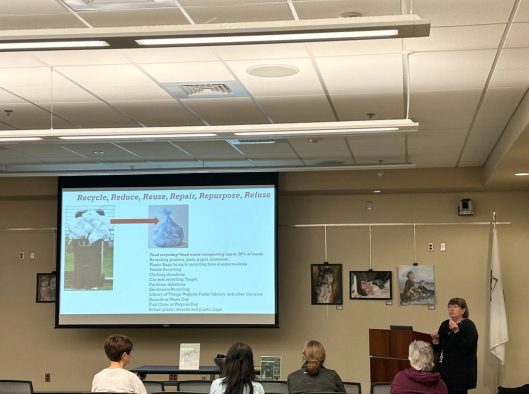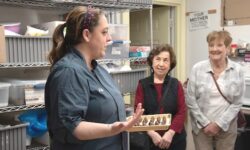By Madison Butkus
Hometown Weekly Reporter
Recently, the Walpole Public Library (WPL) hosted the Town of Walpole Waste Reduction Committee (formerly known as the Recycling Committee) to present ways in which the residents of Walpole can create less trash through composting. This event was sponsored by Walpole Green and the Friends of the Walpole Public Library.
According to the WPL’s website, “This presentation will focus on food waste composting as one strategy for reducing the waste per household and helping to reduce greenhouse gasses which are so damaging to the earth’s atmosphere. According to the MA DEP, the town of Walpole is on record for discarding over 2200 pounds of trash per household per year. This is one of the highest rates in the state. The time is right for residents to take this opportunity to focus their efforts on waste reduction strategies such as reduce, reuse, repair, repurpose, recycle, and compost food waste.”
Residents packed into the Community Room of the WPL, eager to hear Mary McDougall RN, MPH, DNP discuss ways in which Walpole can better themselves as a community when it comes to reducing food waste. At the beginning of her presentation, McDougall explained how food waste is drastically affecting the climate change seen around the globe. This includes aspects like air pollution, changes in vector ecology, increasing allergens, water quality impacts, water & food supply impacts, environmental degradation, extreme heat, and severe weather.
McDougall additionally showed attendees the map of how much trash each town within Massachusetts threw out in 2022. According to the chart, Walpole is among the worst, throwing anywhere between 2001-2500 pounds of trash per household per year. With this statistic, she is hopeful that residents within Walpole can make some easy changes to better this number.
One of the changes residents can make is adding composting into their regular routines. By doing so, Walpolers can increase carbon in the soil and keep it out of the atmosphere, help reduce methane and carbon emissions, recycle nutrients, save water to promote healthy soil, reduce high costs of trash removal, and more.
Within the town of Walpole, there are two different options for food waste composting. The first one is known as Backyard Composting in which bins are available at Walpole Town Hall, Board of Health for $25 ($61 value). Upon getting a bin, residents will set up a kitchen basket or container and throw food waste inside it. Acceptable items to throw into these baskets can be found on the Town of Walpole website.
The second option is known as Black Earth which is a biweekly curbside pickup of food waste for composting. The service is $15.99 for one month or $15 a month billed every six months. They also offer a $5 credit for each friend and family referral that is made. Incredibly enough, the cost of this service will decrease as more residents enroll, which is exactly what happened in Sharon where they now pay $10 a month for the service.
This option is easy to enroll in on the Black Earth website, and the Town of Walpole additionally pays for the starter kit. Just as the Backyard Composting, residents will set up a kitchen basket or container and throw food waste inside it. These bins have to be lined with a biodegradable bag. Periodically, everyone would move the kitchen scraps to the larger curbside bin to be picked up by Black Earth.
It is easy changes, like composting, that can be made in order to eliminate the large amount of food waste that is happening within our world today, especially in Walpole. McDougall is hopeful that residents can make a difference and better our community as a whole. For more information about composting, please visit the Town of Walpole’s website at www.walpole-ma.gov/solid-waste-recycling.

























